London School of Commerce: Context of Business - Starbucks Report
VerifiedAdded on 2023/01/09
|12
|3420
|37
Report
AI Summary
This report provides a comprehensive analysis of Starbucks' business context, covering various aspects of its operations and environment. It begins with an introduction outlining the significance of analyzing micro and macro environmental factors for business success, focusing on Starbucks as a case...
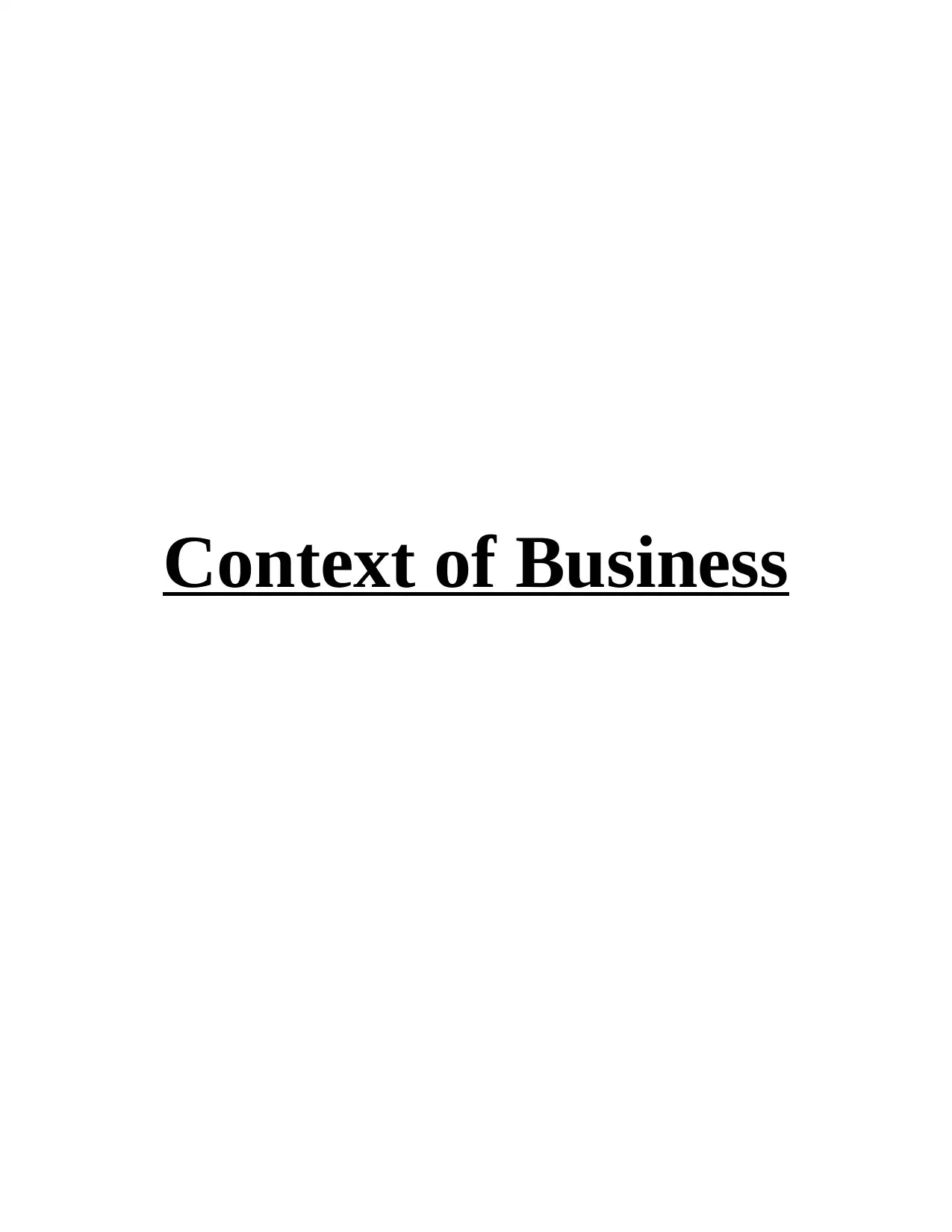
Context of Business
Paraphrase This Document
Need a fresh take? Get an instant paraphrase of this document with our AI Paraphraser
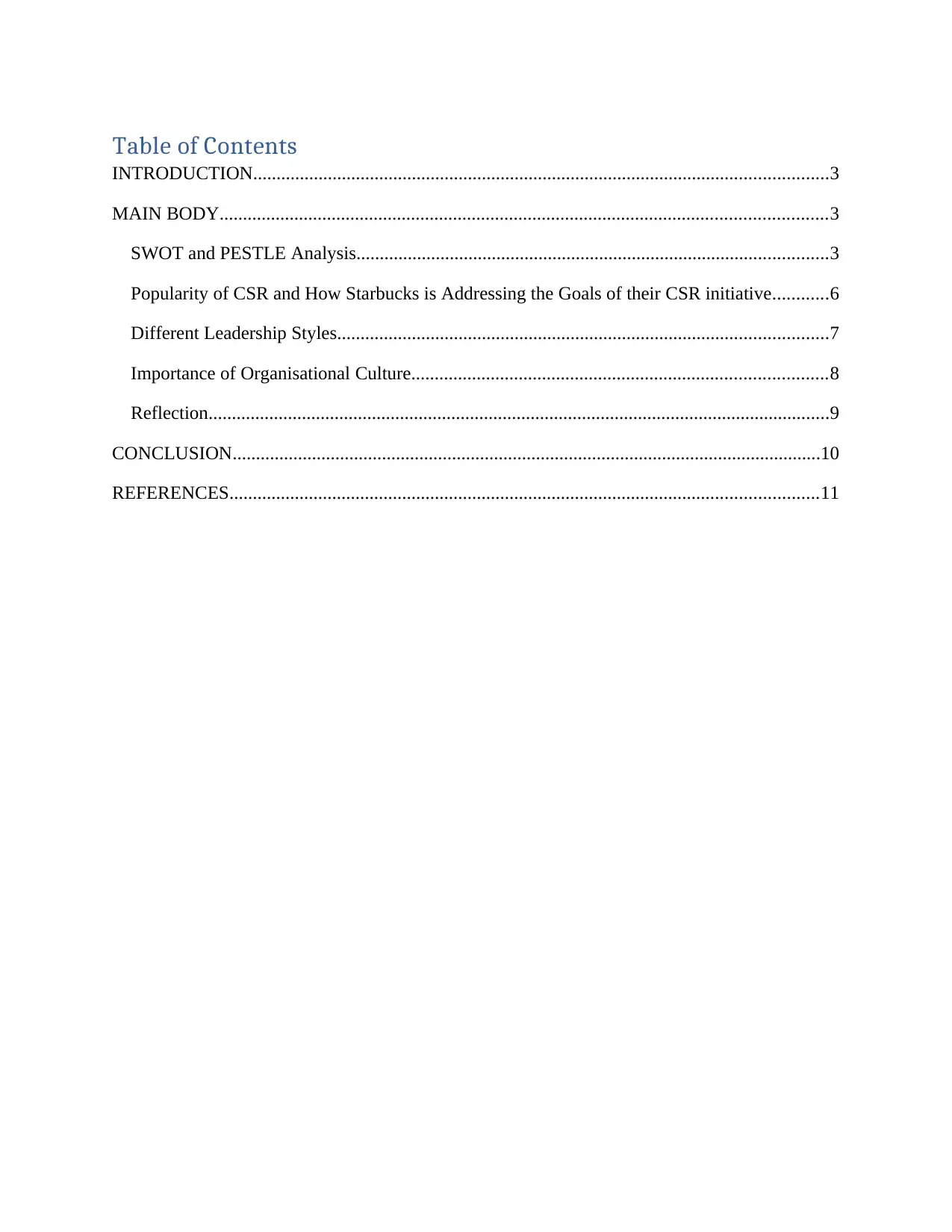
Table of Contents
INTRODUCTION...........................................................................................................................3
MAIN BODY..................................................................................................................................3
SWOT and PESTLE Analysis.....................................................................................................3
Popularity of CSR and How Starbucks is Addressing the Goals of their CSR initiative............6
Different Leadership Styles.........................................................................................................7
Importance of Organisational Culture.........................................................................................8
Reflection.....................................................................................................................................9
CONCLUSION..............................................................................................................................10
REFERENCES..............................................................................................................................11
INTRODUCTION...........................................................................................................................3
MAIN BODY..................................................................................................................................3
SWOT and PESTLE Analysis.....................................................................................................3
Popularity of CSR and How Starbucks is Addressing the Goals of their CSR initiative............6
Different Leadership Styles.........................................................................................................7
Importance of Organisational Culture.........................................................................................8
Reflection.....................................................................................................................................9
CONCLUSION..............................................................................................................................10
REFERENCES..............................................................................................................................11
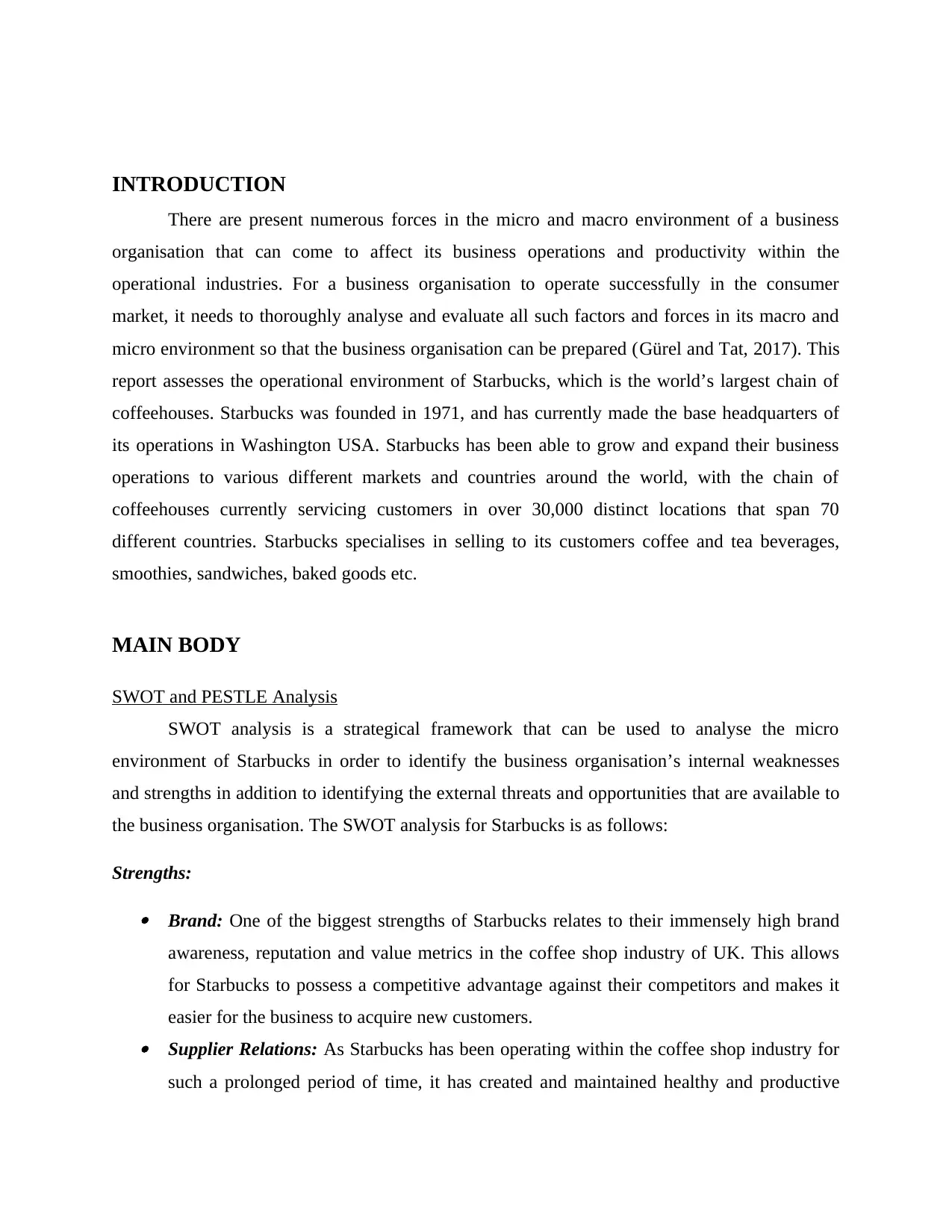
INTRODUCTION
There are present numerous forces in the micro and macro environment of a business
organisation that can come to affect its business operations and productivity within the
operational industries. For a business organisation to operate successfully in the consumer
market, it needs to thoroughly analyse and evaluate all such factors and forces in its macro and
micro environment so that the business organisation can be prepared (Gürel and Tat, 2017). This
report assesses the operational environment of Starbucks, which is the world’s largest chain of
coffeehouses. Starbucks was founded in 1971, and has currently made the base headquarters of
its operations in Washington USA. Starbucks has been able to grow and expand their business
operations to various different markets and countries around the world, with the chain of
coffeehouses currently servicing customers in over 30,000 distinct locations that span 70
different countries. Starbucks specialises in selling to its customers coffee and tea beverages,
smoothies, sandwiches, baked goods etc.
MAIN BODY
SWOT and PESTLE Analysis
SWOT analysis is a strategical framework that can be used to analyse the micro
environment of Starbucks in order to identify the business organisation’s internal weaknesses
and strengths in addition to identifying the external threats and opportunities that are available to
the business organisation. The SWOT analysis for Starbucks is as follows:
Strengths:
Brand: One of the biggest strengths of Starbucks relates to their immensely high brand
awareness, reputation and value metrics in the coffee shop industry of UK. This allows
for Starbucks to possess a competitive advantage against their competitors and makes it
easier for the business to acquire new customers. Supplier Relations: As Starbucks has been operating within the coffee shop industry for
such a prolonged period of time, it has created and maintained healthy and productive
There are present numerous forces in the micro and macro environment of a business
organisation that can come to affect its business operations and productivity within the
operational industries. For a business organisation to operate successfully in the consumer
market, it needs to thoroughly analyse and evaluate all such factors and forces in its macro and
micro environment so that the business organisation can be prepared (Gürel and Tat, 2017). This
report assesses the operational environment of Starbucks, which is the world’s largest chain of
coffeehouses. Starbucks was founded in 1971, and has currently made the base headquarters of
its operations in Washington USA. Starbucks has been able to grow and expand their business
operations to various different markets and countries around the world, with the chain of
coffeehouses currently servicing customers in over 30,000 distinct locations that span 70
different countries. Starbucks specialises in selling to its customers coffee and tea beverages,
smoothies, sandwiches, baked goods etc.
MAIN BODY
SWOT and PESTLE Analysis
SWOT analysis is a strategical framework that can be used to analyse the micro
environment of Starbucks in order to identify the business organisation’s internal weaknesses
and strengths in addition to identifying the external threats and opportunities that are available to
the business organisation. The SWOT analysis for Starbucks is as follows:
Strengths:
Brand: One of the biggest strengths of Starbucks relates to their immensely high brand
awareness, reputation and value metrics in the coffee shop industry of UK. This allows
for Starbucks to possess a competitive advantage against their competitors and makes it
easier for the business to acquire new customers. Supplier Relations: As Starbucks has been operating within the coffee shop industry for
such a prolonged period of time, it has created and maintained healthy and productive
You're viewing a preview
Unlock full access by subscribing today!
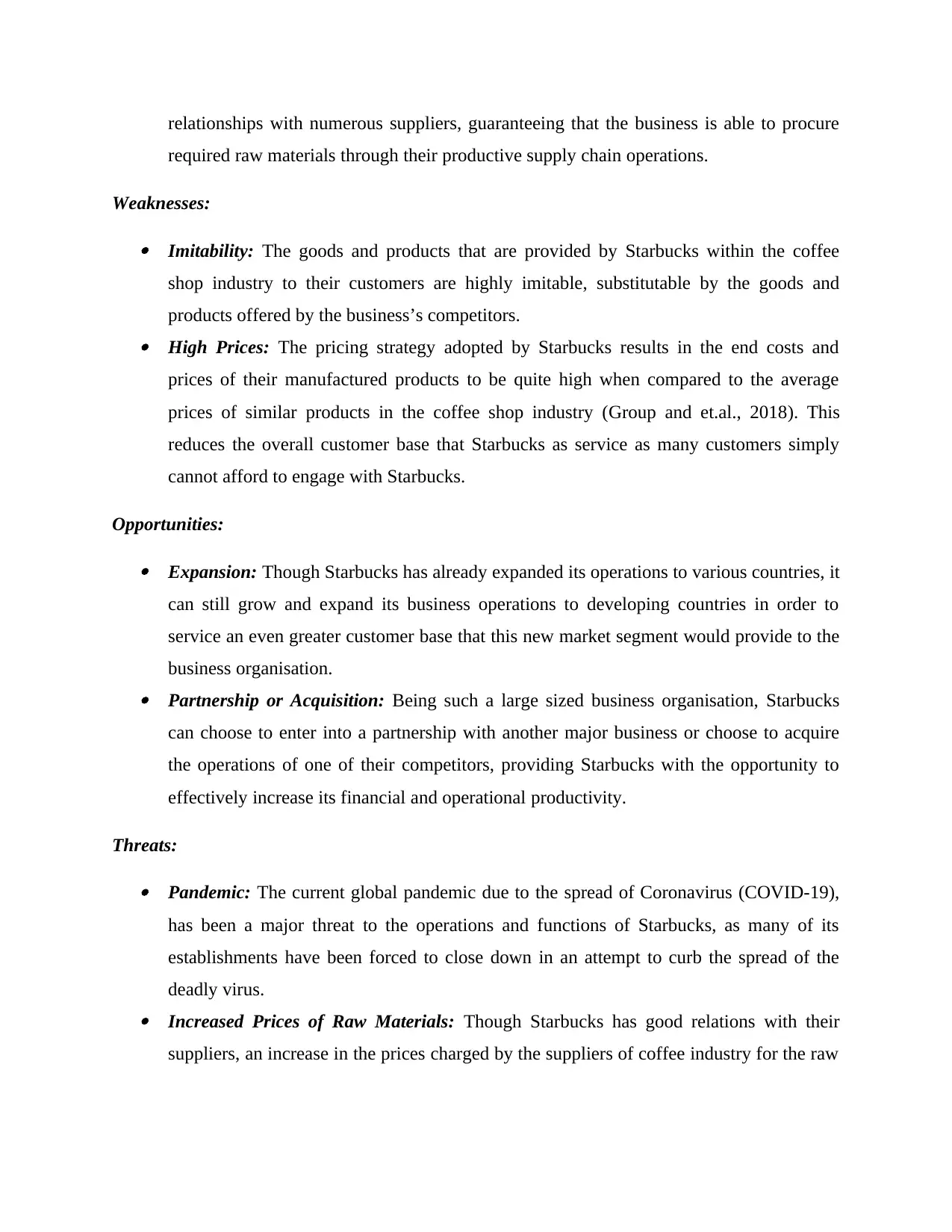
relationships with numerous suppliers, guaranteeing that the business is able to procure
required raw materials through their productive supply chain operations.
Weaknesses:
Imitability: The goods and products that are provided by Starbucks within the coffee
shop industry to their customers are highly imitable, substitutable by the goods and
products offered by the business’s competitors. High Prices: The pricing strategy adopted by Starbucks results in the end costs and
prices of their manufactured products to be quite high when compared to the average
prices of similar products in the coffee shop industry (Group and et.al., 2018). This
reduces the overall customer base that Starbucks as service as many customers simply
cannot afford to engage with Starbucks.
Opportunities:
Expansion: Though Starbucks has already expanded its operations to various countries, it
can still grow and expand its business operations to developing countries in order to
service an even greater customer base that this new market segment would provide to the
business organisation. Partnership or Acquisition: Being such a large sized business organisation, Starbucks
can choose to enter into a partnership with another major business or choose to acquire
the operations of one of their competitors, providing Starbucks with the opportunity to
effectively increase its financial and operational productivity.
Threats:
Pandemic: The current global pandemic due to the spread of Coronavirus (COVID-19),
has been a major threat to the operations and functions of Starbucks, as many of its
establishments have been forced to close down in an attempt to curb the spread of the
deadly virus. Increased Prices of Raw Materials: Though Starbucks has good relations with their
suppliers, an increase in the prices charged by the suppliers of coffee industry for the raw
required raw materials through their productive supply chain operations.
Weaknesses:
Imitability: The goods and products that are provided by Starbucks within the coffee
shop industry to their customers are highly imitable, substitutable by the goods and
products offered by the business’s competitors. High Prices: The pricing strategy adopted by Starbucks results in the end costs and
prices of their manufactured products to be quite high when compared to the average
prices of similar products in the coffee shop industry (Group and et.al., 2018). This
reduces the overall customer base that Starbucks as service as many customers simply
cannot afford to engage with Starbucks.
Opportunities:
Expansion: Though Starbucks has already expanded its operations to various countries, it
can still grow and expand its business operations to developing countries in order to
service an even greater customer base that this new market segment would provide to the
business organisation. Partnership or Acquisition: Being such a large sized business organisation, Starbucks
can choose to enter into a partnership with another major business or choose to acquire
the operations of one of their competitors, providing Starbucks with the opportunity to
effectively increase its financial and operational productivity.
Threats:
Pandemic: The current global pandemic due to the spread of Coronavirus (COVID-19),
has been a major threat to the operations and functions of Starbucks, as many of its
establishments have been forced to close down in an attempt to curb the spread of the
deadly virus. Increased Prices of Raw Materials: Though Starbucks has good relations with their
suppliers, an increase in the prices charged by the suppliers of coffee industry for the raw
Paraphrase This Document
Need a fresh take? Get an instant paraphrase of this document with our AI Paraphraser
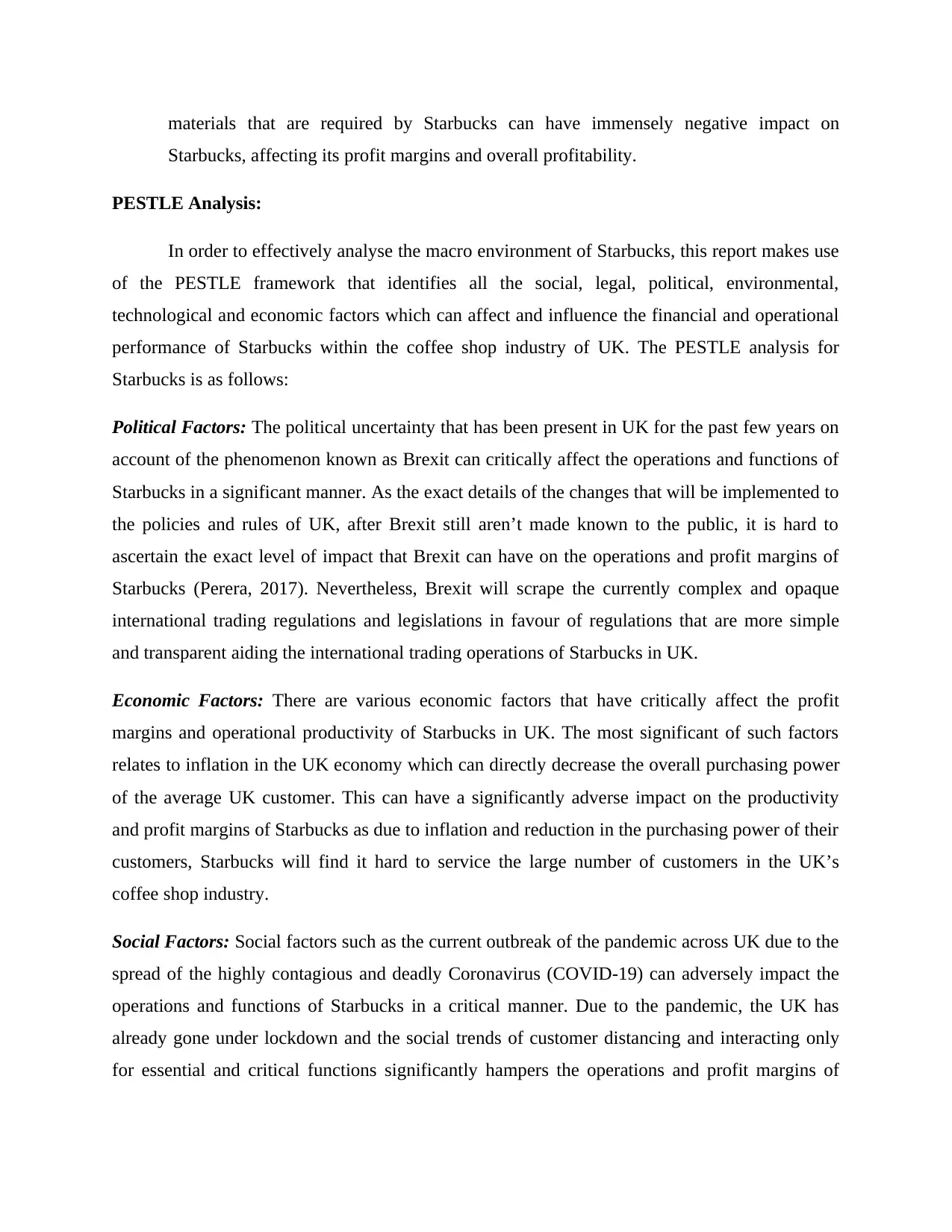
materials that are required by Starbucks can have immensely negative impact on
Starbucks, affecting its profit margins and overall profitability.
PESTLE Analysis:
In order to effectively analyse the macro environment of Starbucks, this report makes use
of the PESTLE framework that identifies all the social, legal, political, environmental,
technological and economic factors which can affect and influence the financial and operational
performance of Starbucks within the coffee shop industry of UK. The PESTLE analysis for
Starbucks is as follows:
Political Factors: The political uncertainty that has been present in UK for the past few years on
account of the phenomenon known as Brexit can critically affect the operations and functions of
Starbucks in a significant manner. As the exact details of the changes that will be implemented to
the policies and rules of UK, after Brexit still aren’t made known to the public, it is hard to
ascertain the exact level of impact that Brexit can have on the operations and profit margins of
Starbucks (Perera, 2017). Nevertheless, Brexit will scrape the currently complex and opaque
international trading regulations and legislations in favour of regulations that are more simple
and transparent aiding the international trading operations of Starbucks in UK.
Economic Factors: There are various economic factors that have critically affect the profit
margins and operational productivity of Starbucks in UK. The most significant of such factors
relates to inflation in the UK economy which can directly decrease the overall purchasing power
of the average UK customer. This can have a significantly adverse impact on the productivity
and profit margins of Starbucks as due to inflation and reduction in the purchasing power of their
customers, Starbucks will find it hard to service the large number of customers in the UK’s
coffee shop industry.
Social Factors: Social factors such as the current outbreak of the pandemic across UK due to the
spread of the highly contagious and deadly Coronavirus (COVID-19) can adversely impact the
operations and functions of Starbucks in a critical manner. Due to the pandemic, the UK has
already gone under lockdown and the social trends of customer distancing and interacting only
for essential and critical functions significantly hampers the operations and profit margins of
Starbucks, affecting its profit margins and overall profitability.
PESTLE Analysis:
In order to effectively analyse the macro environment of Starbucks, this report makes use
of the PESTLE framework that identifies all the social, legal, political, environmental,
technological and economic factors which can affect and influence the financial and operational
performance of Starbucks within the coffee shop industry of UK. The PESTLE analysis for
Starbucks is as follows:
Political Factors: The political uncertainty that has been present in UK for the past few years on
account of the phenomenon known as Brexit can critically affect the operations and functions of
Starbucks in a significant manner. As the exact details of the changes that will be implemented to
the policies and rules of UK, after Brexit still aren’t made known to the public, it is hard to
ascertain the exact level of impact that Brexit can have on the operations and profit margins of
Starbucks (Perera, 2017). Nevertheless, Brexit will scrape the currently complex and opaque
international trading regulations and legislations in favour of regulations that are more simple
and transparent aiding the international trading operations of Starbucks in UK.
Economic Factors: There are various economic factors that have critically affect the profit
margins and operational productivity of Starbucks in UK. The most significant of such factors
relates to inflation in the UK economy which can directly decrease the overall purchasing power
of the average UK customer. This can have a significantly adverse impact on the productivity
and profit margins of Starbucks as due to inflation and reduction in the purchasing power of their
customers, Starbucks will find it hard to service the large number of customers in the UK’s
coffee shop industry.
Social Factors: Social factors such as the current outbreak of the pandemic across UK due to the
spread of the highly contagious and deadly Coronavirus (COVID-19) can adversely impact the
operations and functions of Starbucks in a critical manner. Due to the pandemic, the UK has
already gone under lockdown and the social trends of customer distancing and interacting only
for essential and critical functions significantly hampers the operations and profit margins of
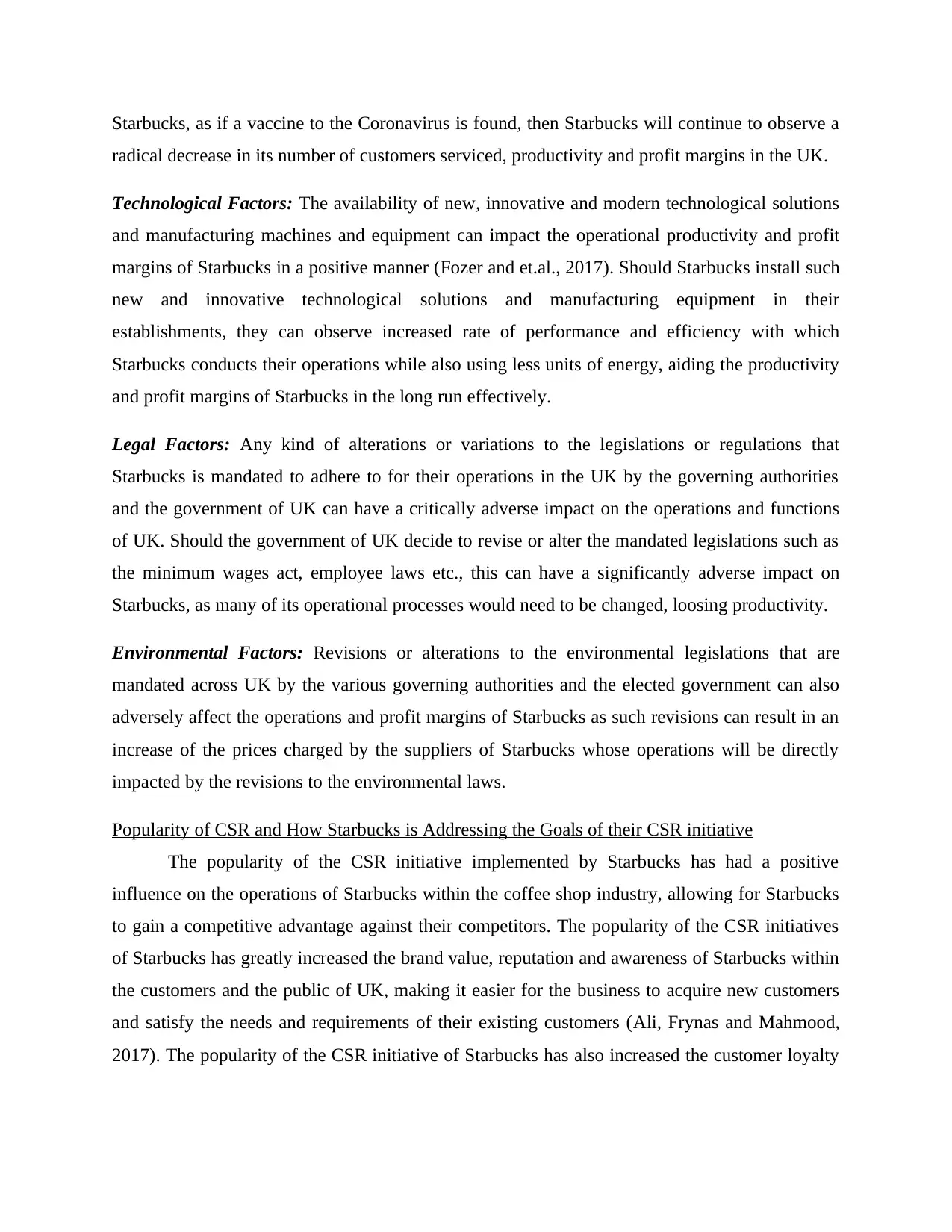
Starbucks, as if a vaccine to the Coronavirus is found, then Starbucks will continue to observe a
radical decrease in its number of customers serviced, productivity and profit margins in the UK.
Technological Factors: The availability of new, innovative and modern technological solutions
and manufacturing machines and equipment can impact the operational productivity and profit
margins of Starbucks in a positive manner (Fozer and et.al., 2017). Should Starbucks install such
new and innovative technological solutions and manufacturing equipment in their
establishments, they can observe increased rate of performance and efficiency with which
Starbucks conducts their operations while also using less units of energy, aiding the productivity
and profit margins of Starbucks in the long run effectively.
Legal Factors: Any kind of alterations or variations to the legislations or regulations that
Starbucks is mandated to adhere to for their operations in the UK by the governing authorities
and the government of UK can have a critically adverse impact on the operations and functions
of UK. Should the government of UK decide to revise or alter the mandated legislations such as
the minimum wages act, employee laws etc., this can have a significantly adverse impact on
Starbucks, as many of its operational processes would need to be changed, loosing productivity.
Environmental Factors: Revisions or alterations to the environmental legislations that are
mandated across UK by the various governing authorities and the elected government can also
adversely affect the operations and profit margins of Starbucks as such revisions can result in an
increase of the prices charged by the suppliers of Starbucks whose operations will be directly
impacted by the revisions to the environmental laws.
Popularity of CSR and How Starbucks is Addressing the Goals of their CSR initiative
The popularity of the CSR initiative implemented by Starbucks has had a positive
influence on the operations of Starbucks within the coffee shop industry, allowing for Starbucks
to gain a competitive advantage against their competitors. The popularity of the CSR initiatives
of Starbucks has greatly increased the brand value, reputation and awareness of Starbucks within
the customers and the public of UK, making it easier for the business to acquire new customers
and satisfy the needs and requirements of their existing customers (Ali, Frynas and Mahmood,
2017). The popularity of the CSR initiative of Starbucks has also increased the customer loyalty
radical decrease in its number of customers serviced, productivity and profit margins in the UK.
Technological Factors: The availability of new, innovative and modern technological solutions
and manufacturing machines and equipment can impact the operational productivity and profit
margins of Starbucks in a positive manner (Fozer and et.al., 2017). Should Starbucks install such
new and innovative technological solutions and manufacturing equipment in their
establishments, they can observe increased rate of performance and efficiency with which
Starbucks conducts their operations while also using less units of energy, aiding the productivity
and profit margins of Starbucks in the long run effectively.
Legal Factors: Any kind of alterations or variations to the legislations or regulations that
Starbucks is mandated to adhere to for their operations in the UK by the governing authorities
and the government of UK can have a critically adverse impact on the operations and functions
of UK. Should the government of UK decide to revise or alter the mandated legislations such as
the minimum wages act, employee laws etc., this can have a significantly adverse impact on
Starbucks, as many of its operational processes would need to be changed, loosing productivity.
Environmental Factors: Revisions or alterations to the environmental legislations that are
mandated across UK by the various governing authorities and the elected government can also
adversely affect the operations and profit margins of Starbucks as such revisions can result in an
increase of the prices charged by the suppliers of Starbucks whose operations will be directly
impacted by the revisions to the environmental laws.
Popularity of CSR and How Starbucks is Addressing the Goals of their CSR initiative
The popularity of the CSR initiative implemented by Starbucks has had a positive
influence on the operations of Starbucks within the coffee shop industry, allowing for Starbucks
to gain a competitive advantage against their competitors. The popularity of the CSR initiatives
of Starbucks has greatly increased the brand value, reputation and awareness of Starbucks within
the customers and the public of UK, making it easier for the business to acquire new customers
and satisfy the needs and requirements of their existing customers (Ali, Frynas and Mahmood,
2017). The popularity of the CSR initiative of Starbucks has also increased the customer loyalty
You're viewing a preview
Unlock full access by subscribing today!
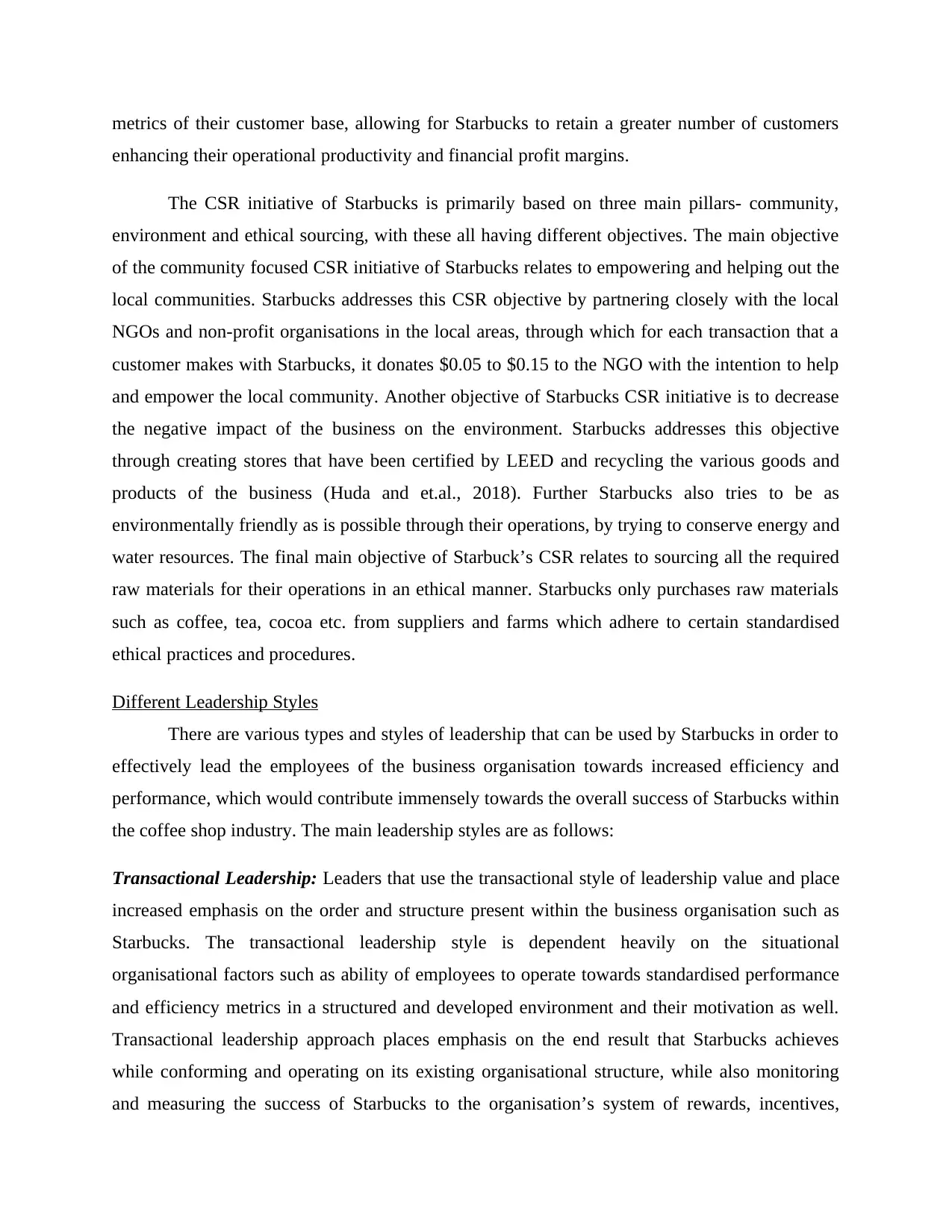
metrics of their customer base, allowing for Starbucks to retain a greater number of customers
enhancing their operational productivity and financial profit margins.
The CSR initiative of Starbucks is primarily based on three main pillars- community,
environment and ethical sourcing, with these all having different objectives. The main objective
of the community focused CSR initiative of Starbucks relates to empowering and helping out the
local communities. Starbucks addresses this CSR objective by partnering closely with the local
NGOs and non-profit organisations in the local areas, through which for each transaction that a
customer makes with Starbucks, it donates $0.05 to $0.15 to the NGO with the intention to help
and empower the local community. Another objective of Starbucks CSR initiative is to decrease
the negative impact of the business on the environment. Starbucks addresses this objective
through creating stores that have been certified by LEED and recycling the various goods and
products of the business (Huda and et.al., 2018). Further Starbucks also tries to be as
environmentally friendly as is possible through their operations, by trying to conserve energy and
water resources. The final main objective of Starbuck’s CSR relates to sourcing all the required
raw materials for their operations in an ethical manner. Starbucks only purchases raw materials
such as coffee, tea, cocoa etc. from suppliers and farms which adhere to certain standardised
ethical practices and procedures.
Different Leadership Styles
There are various types and styles of leadership that can be used by Starbucks in order to
effectively lead the employees of the business organisation towards increased efficiency and
performance, which would contribute immensely towards the overall success of Starbucks within
the coffee shop industry. The main leadership styles are as follows:
Transactional Leadership: Leaders that use the transactional style of leadership value and place
increased emphasis on the order and structure present within the business organisation such as
Starbucks. The transactional leadership style is dependent heavily on the situational
organisational factors such as ability of employees to operate towards standardised performance
and efficiency metrics in a structured and developed environment and their motivation as well.
Transactional leadership approach places emphasis on the end result that Starbucks achieves
while conforming and operating on its existing organisational structure, while also monitoring
and measuring the success of Starbucks to the organisation’s system of rewards, incentives,
enhancing their operational productivity and financial profit margins.
The CSR initiative of Starbucks is primarily based on three main pillars- community,
environment and ethical sourcing, with these all having different objectives. The main objective
of the community focused CSR initiative of Starbucks relates to empowering and helping out the
local communities. Starbucks addresses this CSR objective by partnering closely with the local
NGOs and non-profit organisations in the local areas, through which for each transaction that a
customer makes with Starbucks, it donates $0.05 to $0.15 to the NGO with the intention to help
and empower the local community. Another objective of Starbucks CSR initiative is to decrease
the negative impact of the business on the environment. Starbucks addresses this objective
through creating stores that have been certified by LEED and recycling the various goods and
products of the business (Huda and et.al., 2018). Further Starbucks also tries to be as
environmentally friendly as is possible through their operations, by trying to conserve energy and
water resources. The final main objective of Starbuck’s CSR relates to sourcing all the required
raw materials for their operations in an ethical manner. Starbucks only purchases raw materials
such as coffee, tea, cocoa etc. from suppliers and farms which adhere to certain standardised
ethical practices and procedures.
Different Leadership Styles
There are various types and styles of leadership that can be used by Starbucks in order to
effectively lead the employees of the business organisation towards increased efficiency and
performance, which would contribute immensely towards the overall success of Starbucks within
the coffee shop industry. The main leadership styles are as follows:
Transactional Leadership: Leaders that use the transactional style of leadership value and place
increased emphasis on the order and structure present within the business organisation such as
Starbucks. The transactional leadership style is dependent heavily on the situational
organisational factors such as ability of employees to operate towards standardised performance
and efficiency metrics in a structured and developed environment and their motivation as well.
Transactional leadership approach places emphasis on the end result that Starbucks achieves
while conforming and operating on its existing organisational structure, while also monitoring
and measuring the success of Starbucks to the organisation’s system of rewards, incentives,
Paraphrase This Document
Need a fresh take? Get an instant paraphrase of this document with our AI Paraphraser
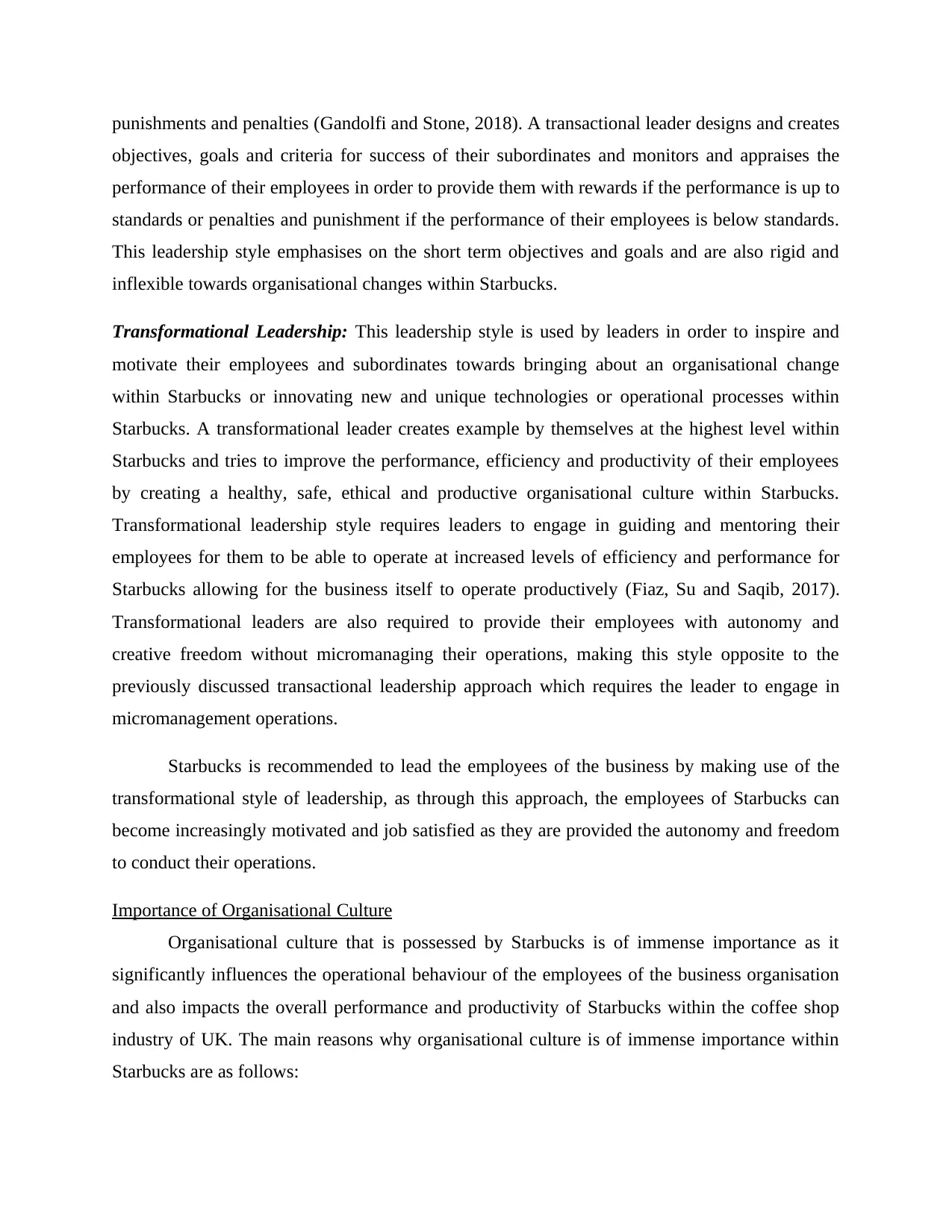
punishments and penalties (Gandolfi and Stone, 2018). A transactional leader designs and creates
objectives, goals and criteria for success of their subordinates and monitors and appraises the
performance of their employees in order to provide them with rewards if the performance is up to
standards or penalties and punishment if the performance of their employees is below standards.
This leadership style emphasises on the short term objectives and goals and are also rigid and
inflexible towards organisational changes within Starbucks.
Transformational Leadership: This leadership style is used by leaders in order to inspire and
motivate their employees and subordinates towards bringing about an organisational change
within Starbucks or innovating new and unique technologies or operational processes within
Starbucks. A transformational leader creates example by themselves at the highest level within
Starbucks and tries to improve the performance, efficiency and productivity of their employees
by creating a healthy, safe, ethical and productive organisational culture within Starbucks.
Transformational leadership style requires leaders to engage in guiding and mentoring their
employees for them to be able to operate at increased levels of efficiency and performance for
Starbucks allowing for the business itself to operate productively (Fiaz, Su and Saqib, 2017).
Transformational leaders are also required to provide their employees with autonomy and
creative freedom without micromanaging their operations, making this style opposite to the
previously discussed transactional leadership approach which requires the leader to engage in
micromanagement operations.
Starbucks is recommended to lead the employees of the business by making use of the
transformational style of leadership, as through this approach, the employees of Starbucks can
become increasingly motivated and job satisfied as they are provided the autonomy and freedom
to conduct their operations.
Importance of Organisational Culture
Organisational culture that is possessed by Starbucks is of immense importance as it
significantly influences the operational behaviour of the employees of the business organisation
and also impacts the overall performance and productivity of Starbucks within the coffee shop
industry of UK. The main reasons why organisational culture is of immense importance within
Starbucks are as follows:
objectives, goals and criteria for success of their subordinates and monitors and appraises the
performance of their employees in order to provide them with rewards if the performance is up to
standards or penalties and punishment if the performance of their employees is below standards.
This leadership style emphasises on the short term objectives and goals and are also rigid and
inflexible towards organisational changes within Starbucks.
Transformational Leadership: This leadership style is used by leaders in order to inspire and
motivate their employees and subordinates towards bringing about an organisational change
within Starbucks or innovating new and unique technologies or operational processes within
Starbucks. A transformational leader creates example by themselves at the highest level within
Starbucks and tries to improve the performance, efficiency and productivity of their employees
by creating a healthy, safe, ethical and productive organisational culture within Starbucks.
Transformational leadership style requires leaders to engage in guiding and mentoring their
employees for them to be able to operate at increased levels of efficiency and performance for
Starbucks allowing for the business itself to operate productively (Fiaz, Su and Saqib, 2017).
Transformational leaders are also required to provide their employees with autonomy and
creative freedom without micromanaging their operations, making this style opposite to the
previously discussed transactional leadership approach which requires the leader to engage in
micromanagement operations.
Starbucks is recommended to lead the employees of the business by making use of the
transformational style of leadership, as through this approach, the employees of Starbucks can
become increasingly motivated and job satisfied as they are provided the autonomy and freedom
to conduct their operations.
Importance of Organisational Culture
Organisational culture that is possessed by Starbucks is of immense importance as it
significantly influences the operational behaviour of the employees of the business organisation
and also impacts the overall performance and productivity of Starbucks within the coffee shop
industry of UK. The main reasons why organisational culture is of immense importance within
Starbucks are as follows:
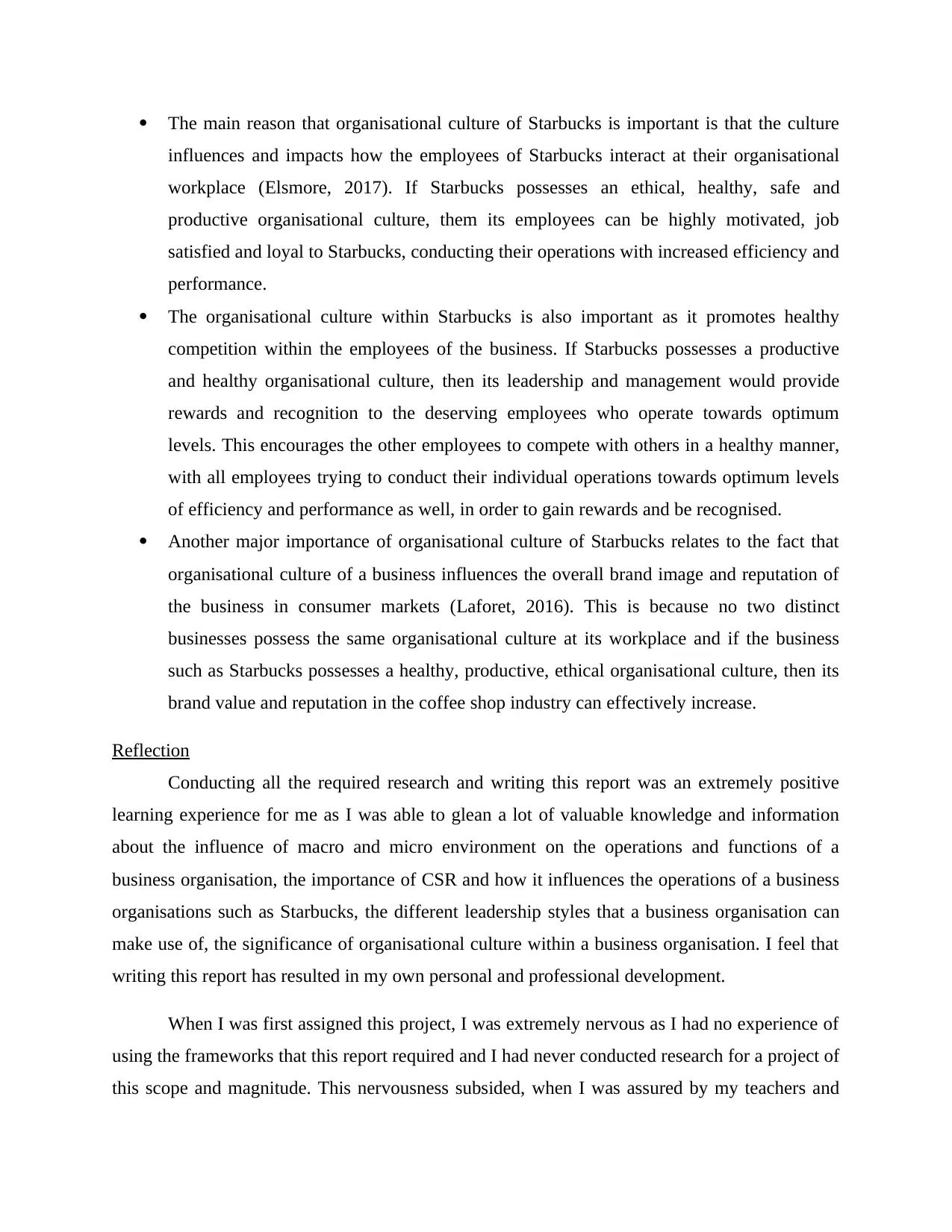
The main reason that organisational culture of Starbucks is important is that the culture
influences and impacts how the employees of Starbucks interact at their organisational
workplace (Elsmore, 2017). If Starbucks possesses an ethical, healthy, safe and
productive organisational culture, them its employees can be highly motivated, job
satisfied and loyal to Starbucks, conducting their operations with increased efficiency and
performance.
The organisational culture within Starbucks is also important as it promotes healthy
competition within the employees of the business. If Starbucks possesses a productive
and healthy organisational culture, then its leadership and management would provide
rewards and recognition to the deserving employees who operate towards optimum
levels. This encourages the other employees to compete with others in a healthy manner,
with all employees trying to conduct their individual operations towards optimum levels
of efficiency and performance as well, in order to gain rewards and be recognised.
Another major importance of organisational culture of Starbucks relates to the fact that
organisational culture of a business influences the overall brand image and reputation of
the business in consumer markets (Laforet, 2016). This is because no two distinct
businesses possess the same organisational culture at its workplace and if the business
such as Starbucks possesses a healthy, productive, ethical organisational culture, then its
brand value and reputation in the coffee shop industry can effectively increase.
Reflection
Conducting all the required research and writing this report was an extremely positive
learning experience for me as I was able to glean a lot of valuable knowledge and information
about the influence of macro and micro environment on the operations and functions of a
business organisation, the importance of CSR and how it influences the operations of a business
organisations such as Starbucks, the different leadership styles that a business organisation can
make use of, the significance of organisational culture within a business organisation. I feel that
writing this report has resulted in my own personal and professional development.
When I was first assigned this project, I was extremely nervous as I had no experience of
using the frameworks that this report required and I had never conducted research for a project of
this scope and magnitude. This nervousness subsided, when I was assured by my teachers and
influences and impacts how the employees of Starbucks interact at their organisational
workplace (Elsmore, 2017). If Starbucks possesses an ethical, healthy, safe and
productive organisational culture, them its employees can be highly motivated, job
satisfied and loyal to Starbucks, conducting their operations with increased efficiency and
performance.
The organisational culture within Starbucks is also important as it promotes healthy
competition within the employees of the business. If Starbucks possesses a productive
and healthy organisational culture, then its leadership and management would provide
rewards and recognition to the deserving employees who operate towards optimum
levels. This encourages the other employees to compete with others in a healthy manner,
with all employees trying to conduct their individual operations towards optimum levels
of efficiency and performance as well, in order to gain rewards and be recognised.
Another major importance of organisational culture of Starbucks relates to the fact that
organisational culture of a business influences the overall brand image and reputation of
the business in consumer markets (Laforet, 2016). This is because no two distinct
businesses possess the same organisational culture at its workplace and if the business
such as Starbucks possesses a healthy, productive, ethical organisational culture, then its
brand value and reputation in the coffee shop industry can effectively increase.
Reflection
Conducting all the required research and writing this report was an extremely positive
learning experience for me as I was able to glean a lot of valuable knowledge and information
about the influence of macro and micro environment on the operations and functions of a
business organisation, the importance of CSR and how it influences the operations of a business
organisations such as Starbucks, the different leadership styles that a business organisation can
make use of, the significance of organisational culture within a business organisation. I feel that
writing this report has resulted in my own personal and professional development.
When I was first assigned this project, I was extremely nervous as I had no experience of
using the frameworks that this report required and I had never conducted research for a project of
this scope and magnitude. This nervousness subsided, when I was assured by my teachers and
You're viewing a preview
Unlock full access by subscribing today!
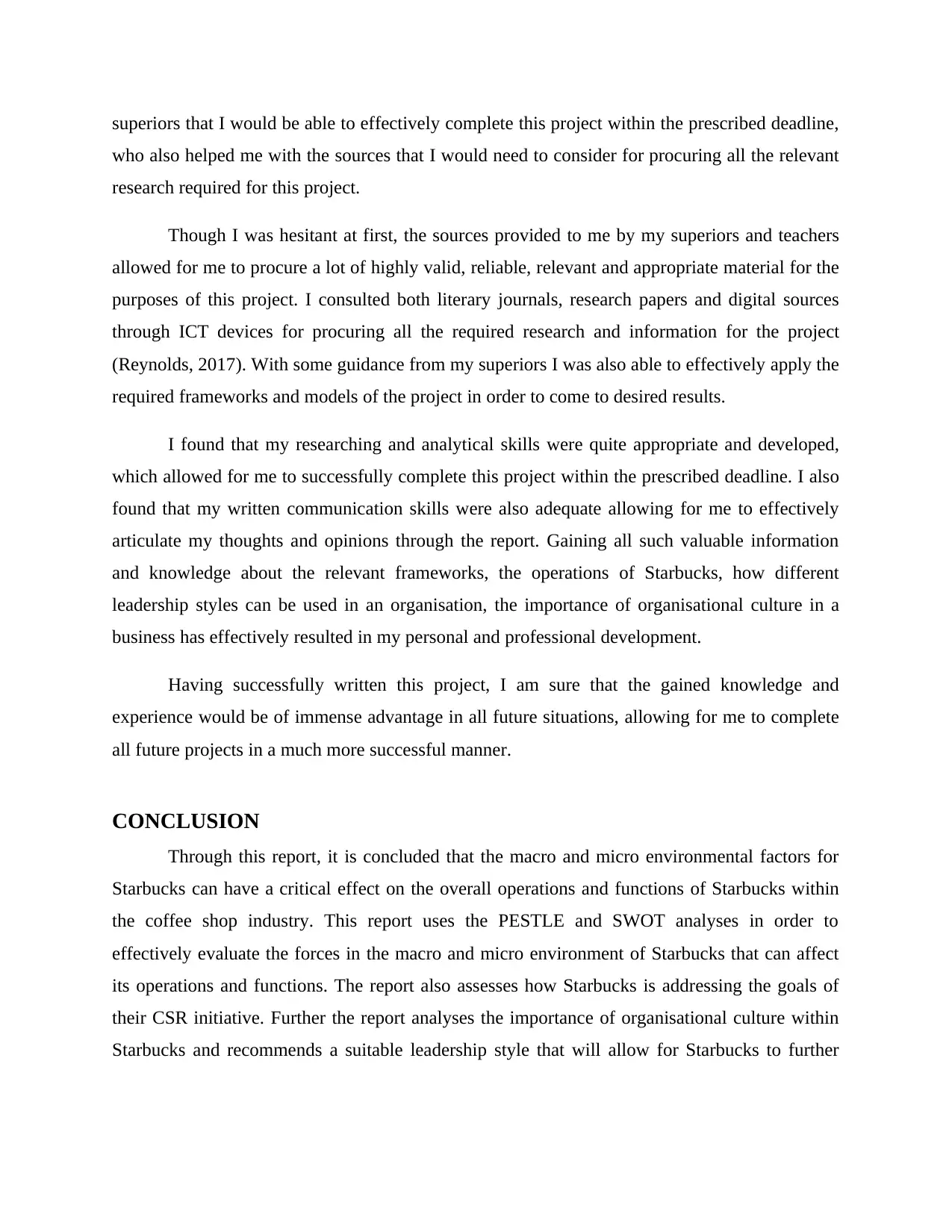
superiors that I would be able to effectively complete this project within the prescribed deadline,
who also helped me with the sources that I would need to consider for procuring all the relevant
research required for this project.
Though I was hesitant at first, the sources provided to me by my superiors and teachers
allowed for me to procure a lot of highly valid, reliable, relevant and appropriate material for the
purposes of this project. I consulted both literary journals, research papers and digital sources
through ICT devices for procuring all the required research and information for the project
(Reynolds, 2017). With some guidance from my superiors I was also able to effectively apply the
required frameworks and models of the project in order to come to desired results.
I found that my researching and analytical skills were quite appropriate and developed,
which allowed for me to successfully complete this project within the prescribed deadline. I also
found that my written communication skills were also adequate allowing for me to effectively
articulate my thoughts and opinions through the report. Gaining all such valuable information
and knowledge about the relevant frameworks, the operations of Starbucks, how different
leadership styles can be used in an organisation, the importance of organisational culture in a
business has effectively resulted in my personal and professional development.
Having successfully written this project, I am sure that the gained knowledge and
experience would be of immense advantage in all future situations, allowing for me to complete
all future projects in a much more successful manner.
CONCLUSION
Through this report, it is concluded that the macro and micro environmental factors for
Starbucks can have a critical effect on the overall operations and functions of Starbucks within
the coffee shop industry. This report uses the PESTLE and SWOT analyses in order to
effectively evaluate the forces in the macro and micro environment of Starbucks that can affect
its operations and functions. The report also assesses how Starbucks is addressing the goals of
their CSR initiative. Further the report analyses the importance of organisational culture within
Starbucks and recommends a suitable leadership style that will allow for Starbucks to further
who also helped me with the sources that I would need to consider for procuring all the relevant
research required for this project.
Though I was hesitant at first, the sources provided to me by my superiors and teachers
allowed for me to procure a lot of highly valid, reliable, relevant and appropriate material for the
purposes of this project. I consulted both literary journals, research papers and digital sources
through ICT devices for procuring all the required research and information for the project
(Reynolds, 2017). With some guidance from my superiors I was also able to effectively apply the
required frameworks and models of the project in order to come to desired results.
I found that my researching and analytical skills were quite appropriate and developed,
which allowed for me to successfully complete this project within the prescribed deadline. I also
found that my written communication skills were also adequate allowing for me to effectively
articulate my thoughts and opinions through the report. Gaining all such valuable information
and knowledge about the relevant frameworks, the operations of Starbucks, how different
leadership styles can be used in an organisation, the importance of organisational culture in a
business has effectively resulted in my personal and professional development.
Having successfully written this project, I am sure that the gained knowledge and
experience would be of immense advantage in all future situations, allowing for me to complete
all future projects in a much more successful manner.
CONCLUSION
Through this report, it is concluded that the macro and micro environmental factors for
Starbucks can have a critical effect on the overall operations and functions of Starbucks within
the coffee shop industry. This report uses the PESTLE and SWOT analyses in order to
effectively evaluate the forces in the macro and micro environment of Starbucks that can affect
its operations and functions. The report also assesses how Starbucks is addressing the goals of
their CSR initiative. Further the report analyses the importance of organisational culture within
Starbucks and recommends a suitable leadership style that will allow for Starbucks to further
Paraphrase This Document
Need a fresh take? Get an instant paraphrase of this document with our AI Paraphraser
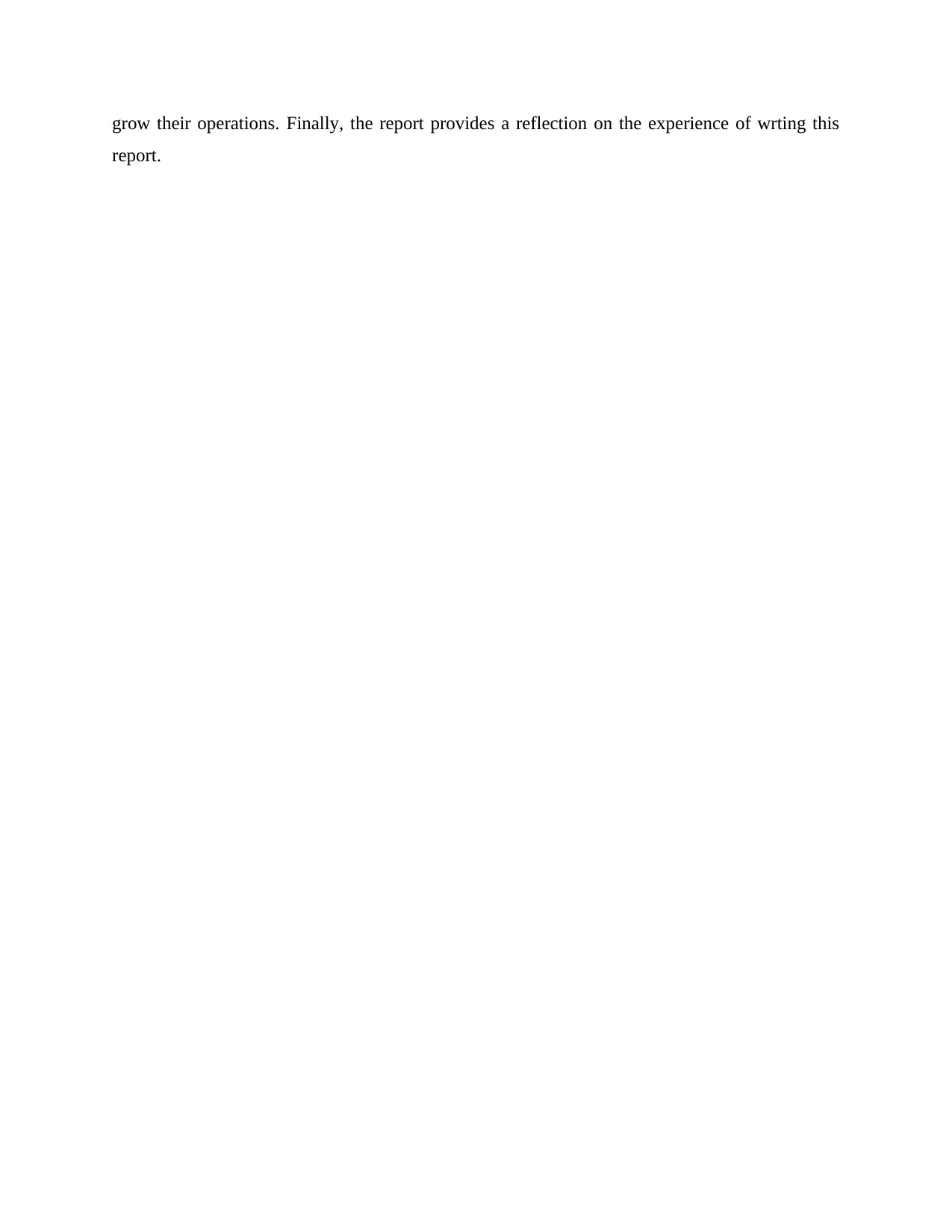
grow their operations. Finally, the report provides a reflection on the experience of wrting this
report.
report.
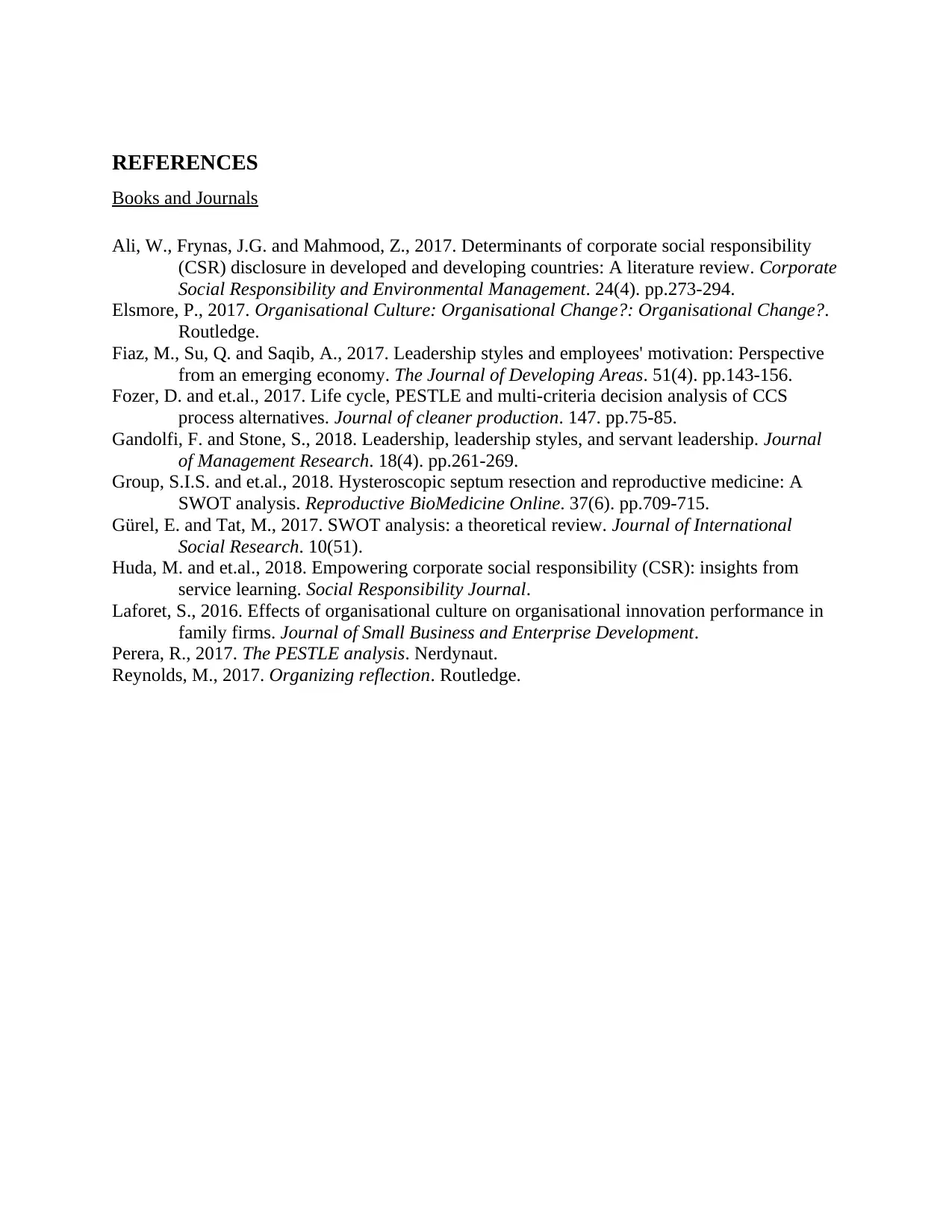
REFERENCES
Books and Journals
Ali, W., Frynas, J.G. and Mahmood, Z., 2017. Determinants of corporate social responsibility
(CSR) disclosure in developed and developing countries: A literature review. Corporate
Social Responsibility and Environmental Management. 24(4). pp.273-294.
Elsmore, P., 2017. Organisational Culture: Organisational Change?: Organisational Change?.
Routledge.
Fiaz, M., Su, Q. and Saqib, A., 2017. Leadership styles and employees' motivation: Perspective
from an emerging economy. The Journal of Developing Areas. 51(4). pp.143-156.
Fozer, D. and et.al., 2017. Life cycle, PESTLE and multi-criteria decision analysis of CCS
process alternatives. Journal of cleaner production. 147. pp.75-85.
Gandolfi, F. and Stone, S., 2018. Leadership, leadership styles, and servant leadership. Journal
of Management Research. 18(4). pp.261-269.
Group, S.I.S. and et.al., 2018. Hysteroscopic septum resection and reproductive medicine: A
SWOT analysis. Reproductive BioMedicine Online. 37(6). pp.709-715.
Gürel, E. and Tat, M., 2017. SWOT analysis: a theoretical review. Journal of International
Social Research. 10(51).
Huda, M. and et.al., 2018. Empowering corporate social responsibility (CSR): insights from
service learning. Social Responsibility Journal.
Laforet, S., 2016. Effects of organisational culture on organisational innovation performance in
family firms. Journal of Small Business and Enterprise Development.
Perera, R., 2017. The PESTLE analysis. Nerdynaut.
Reynolds, M., 2017. Organizing reflection. Routledge.
Books and Journals
Ali, W., Frynas, J.G. and Mahmood, Z., 2017. Determinants of corporate social responsibility
(CSR) disclosure in developed and developing countries: A literature review. Corporate
Social Responsibility and Environmental Management. 24(4). pp.273-294.
Elsmore, P., 2017. Organisational Culture: Organisational Change?: Organisational Change?.
Routledge.
Fiaz, M., Su, Q. and Saqib, A., 2017. Leadership styles and employees' motivation: Perspective
from an emerging economy. The Journal of Developing Areas. 51(4). pp.143-156.
Fozer, D. and et.al., 2017. Life cycle, PESTLE and multi-criteria decision analysis of CCS
process alternatives. Journal of cleaner production. 147. pp.75-85.
Gandolfi, F. and Stone, S., 2018. Leadership, leadership styles, and servant leadership. Journal
of Management Research. 18(4). pp.261-269.
Group, S.I.S. and et.al., 2018. Hysteroscopic septum resection and reproductive medicine: A
SWOT analysis. Reproductive BioMedicine Online. 37(6). pp.709-715.
Gürel, E. and Tat, M., 2017. SWOT analysis: a theoretical review. Journal of International
Social Research. 10(51).
Huda, M. and et.al., 2018. Empowering corporate social responsibility (CSR): insights from
service learning. Social Responsibility Journal.
Laforet, S., 2016. Effects of organisational culture on organisational innovation performance in
family firms. Journal of Small Business and Enterprise Development.
Perera, R., 2017. The PESTLE analysis. Nerdynaut.
Reynolds, M., 2017. Organizing reflection. Routledge.
You're viewing a preview
Unlock full access by subscribing today!
1 out of 12
Related Documents
Your All-in-One AI-Powered Toolkit for Academic Success.
+13062052269
info@desklib.com
Available 24*7 on WhatsApp / Email
![[object Object]](/_next/static/media/star-bottom.7253800d.svg)
Unlock your academic potential
© 2024 | Zucol Services PVT LTD | All rights reserved.




